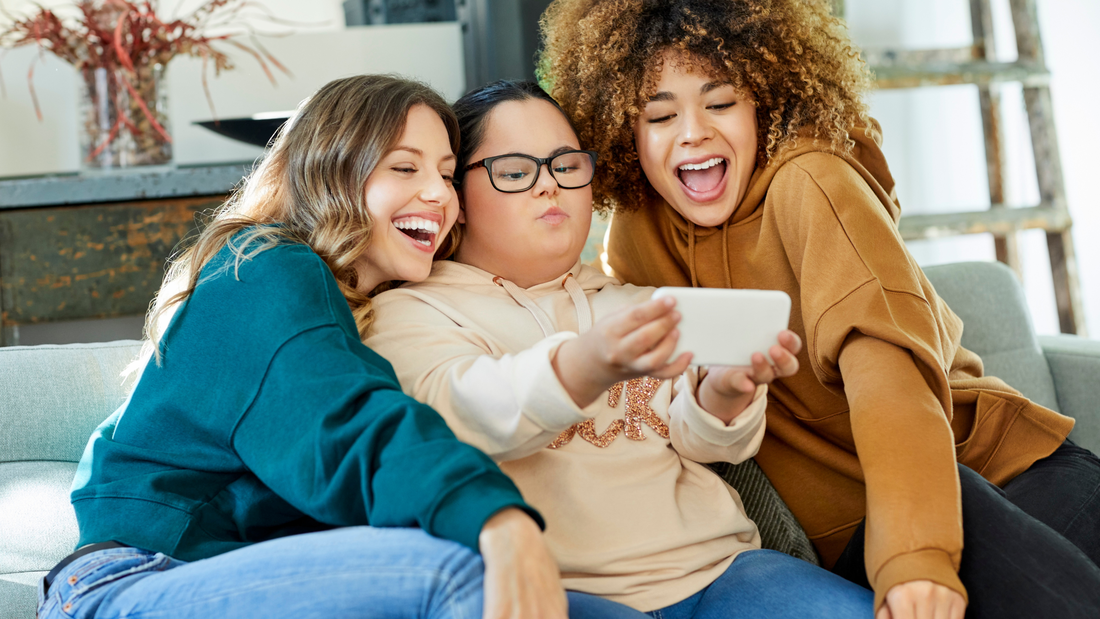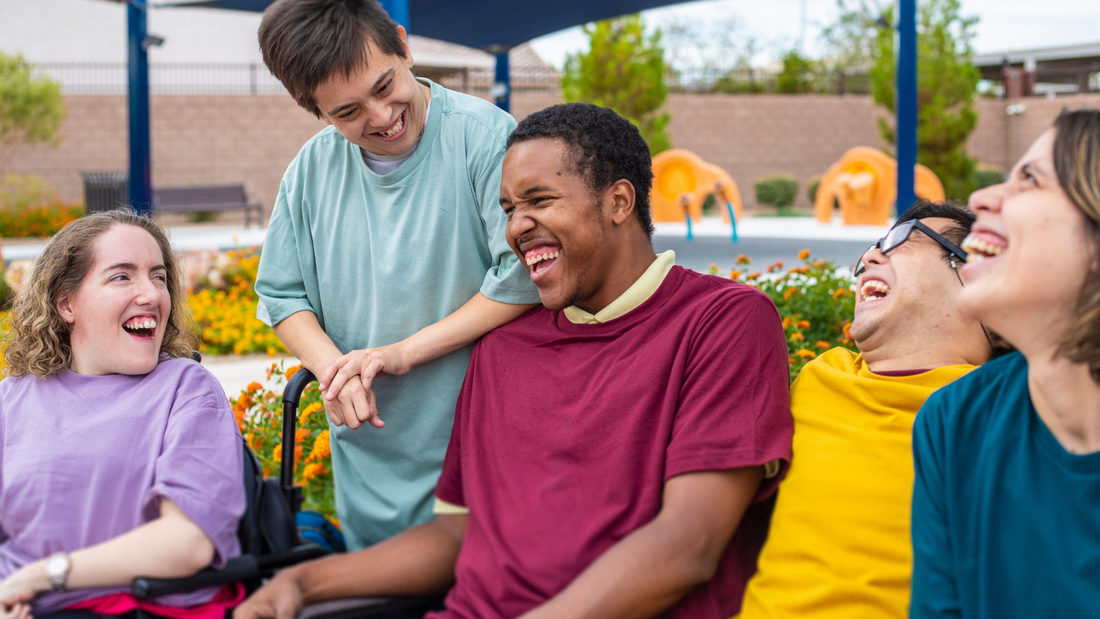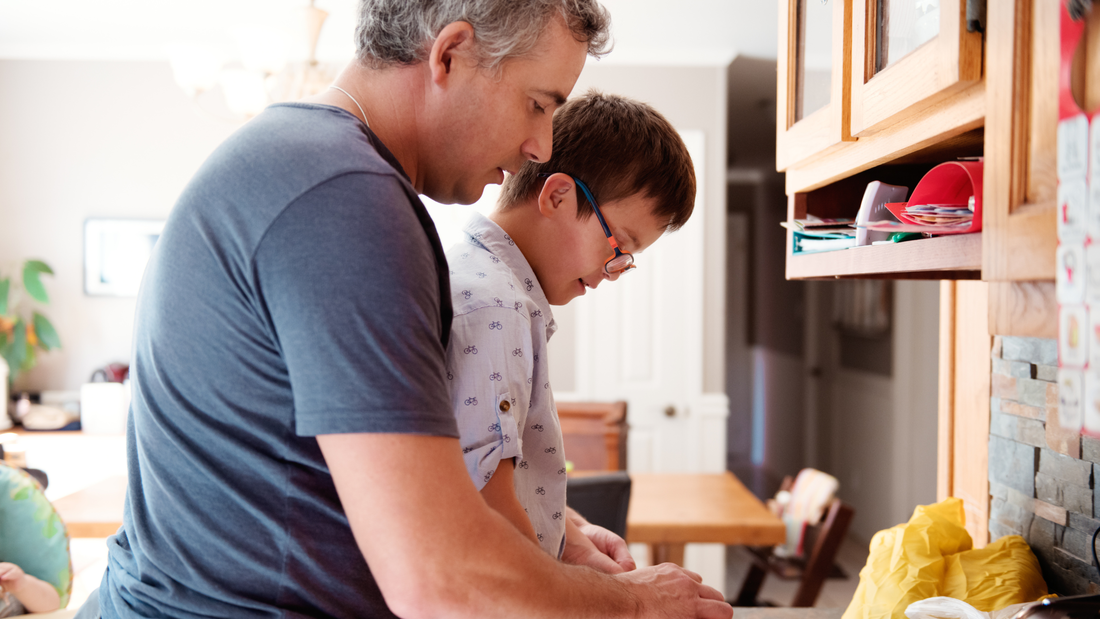|
Developmental disabilities are more common than you may think. Recent surveys show that up to 1 in 6 children have a developmental disability, but raising awareness about these conditions can help us create a more inclusive world. All types of developmental disabilities impact people differently, and understanding each person’s symptoms can help you accommodate their needs in the best way possible.
With occupational therapy and exercise, people with developmental disabilities can manage their symptoms for a healthier, happier lifestyle! Today, we’ll review a few of the most common types of developmental disabilities and discuss why exercise is one of the best ways for differently-abled people to manage their symptoms. What are Developmental Disabilities?There are many different types of disabilities, and if you’re not familiar with the term “developmental disabilities,” you probably know someone who has one. Essentially, developmental disabilities are conditions that impact a person’s physical, cognitive, or behavioral development. These disabilities typically emerge during childhood and persist throughout a person’s life. Different types of developmental disabilities impact a person’s learning abilities, communication skills, social interactions, and their ability to care for themselves. 4 Different Types of Developmental Disabilities While there are many types of developmental disabilities, some are more common than others. Also, it’s important to recognize that developmental disabilities are never the fault of the parent and most people with developmental disabilities are genetically predisposed to their condition. 1. Autism spectrum disorder Recent surveys show that about 1 in 36 children have been diagnosed with autism spectrum disorder (ASD). ASD is a neurodevelopmental condition that changes how a person communicates, socializes, and interacts with other people. Since ASD exists on a spectrum, symptoms can vary greatly, but most people with ASD exhibit the following traits:
2. Cerebral palsy Cerebral palsy (CP) is a neurological disorder that affects movement, muscle tone, and coordination. Sometimes, CP develops as a result of damage to a person’s developing brain, typically occurring before or during birth. However, some people develop CP in early childhood. When this brain damage happens, it interferes with the brain’s ability to control muscle movements and posture. While CP symptoms vary from person to person, they often include the following:
Fortunately, early intervention, speech therapy, and exercises for cerebral palsy can help children learn how to manage their symptoms and become independent. 3. Down syndrome Down syndrome is a condition that occurs when a person is born with an extra chromosome. The extra chromosome changes how a person’s brain and body develop. Although people with Down syndrome appear similar, every person has different traits. Some of the common characteristics of Down syndrome include:
As with most different types of developmental disabilities, people with Down syndrome can lead healthy, happy lives by managing their symptoms with exercises for Down syndrome, occupational therapy, and speech therapy. 4. Fetal alcohol spectrum disorders Unlike other types of developmental disabilities, fetal alcohol spectrum disorders (FASDs) occur when a person is exposed to alcohol before birth. In most cases, this happens by accident because women may not know they’re pregnant for up to six weeks. Everyone with FASD has different traits, such as:
How Exercises Can Help You Manage Developmental Disabilities Exercise is an important part of living a healthy lifestyle, and people with all types of developmental disabilities aren’t any different! There are plenty of studies that show how regular exercise improves cognitive function, cardiovascular health, and a person’s overall quality of life. However, people with developmental disabilities may not get as much exercise as their peers. Sometimes, this is due to the fact that there aren’t many fitness programs that cater to the needs of differently-abled people. When people with developmental disabilities don’t have the resources to meet their fitness needs, it can significantly negatively impact physical, mental, and emotional help. The good news is that special needs fitness programs like Let’s Go Fitness create a safe space for people with developmental disabilities to work out with friends, get in shape, and have fun along the way! Just remember to consult a licensed healthcare provider embarking on a fitness journey with someone who has a developmental disability. With regular exercise, people with developmental disabilities can manage their symptoms better and make friends with people that are just like them! Get Fit with Let’s Go Fitness If you’re looking for a special needs fitness program but you’re not sure where to start, our team at Let’s Go Fitness is here to help. We provide special needs fitness programs for differently-abled individuals. At Let's Go Fitness, we strive to create a welcoming environment where anyone can make friends, get in shape, and have fun doing it! Our adaptive fitness specialists guide participants every step of the way. Whether our athletes need accommodations, modifications, or simply an understanding listener, we'll help everyone reach their goals. Are you ready to start a fitness journey for yourself or a loved one? Contact Let's Go Fitness today to learn more about our membership packages! The media and society seem to have quite polarizing opinions about people with disabilities. They're either portrayed as heroic and superhuman or as helpless victims. These stereotypes about disabilities can make differently-abled people feel limited.
To make matters worse, differently-abled people often face severe repercussions due to these stereotypes. They may be excluded from social groups, miss job opportunities, or fall behind in school due the negative beliefs of others. And sometimes, people with disabilities begin to believe these negative stereotypes, which can be detrimental to their mental health and quality of life. Everyone deals with stereotypes that affect them differently, but through education and open, honest discussions with differently-abled people, we can work together to create an inclusive, supportive society. Stereotypes About Disabilities: What is Disability Stigma? Unfortunately, there are still quite a few stereotypes about disabilities that can create a "disability stigma," which is a set of negative beliefs about people with disabilities. Historically, people with disabilities have been associated with diseases, curses, helplessness, and other erroneous beliefs. Before empowering people with disabilities, we need to understand how disability stigmas affect their daily lives. While every differently-abled person is different, the disability stigma can play out in the following ways:
While none of these negative beliefs are true, they significantly impact the lives of differently-abled individuals. The good news is that, together, we can eliminate disability stigmas by breaking down stereotypes about disabilities and listening to the concerns of differently-abled individuals. The Most Common Stereotypes About Disabilities It's important to acknowledge that stereotypes are oversimplified generalizations or assumptions about a group of people and often perpetuate misconceptions and discrimination. Also, stereotypes about people with diverse abilities can greatly vary depending on a person's cultural, societal, and individual perspectives. Let's discuss some of the most prominent stereotypes about disabilities and why they're harmful to people with disabilities. 1. People with Disabilities are "Brave" Most people don't mean any harm when they say that differently-abled people are "brave" or "courageous," but many people with disabilities find these phrases of this nature patronizing and even offensive. People with disabilities want to be treated the same as everyone else, which means that they don't want praise for living independently. Most differently-abled people don’t feel as though they’re exceptionally courageous for simply living their lives. 2. People with Disabilities Can't Enjoy Certain Activities Sometimes, able-bodied people view people with disabilities as incompetent and unable to enjoy fun activities. This erroneous stereotype about people with disabilities from having fulfilling experiences with others. In many cases, people say that this type of treatment feels more debilitating than their disability. The truth is people with developmental disabilities can make significant contributions to the workforce and society. People with physical disabilities can exercise and form meaningful relationships, while visually impaired people can enjoy cinema and read books. 3. People with Disabilities Have Enhanced Senses A common stereotype about disabilities is that differently-abled people have stronger senses than others. In other words, there's a prevalent misconception that when a person loses one sense, their other senses are enhanced. While this stereotype may seem relatively harmless at first, it plays into these stereotypes about disabilities playing into the belief that differently-abled individuals are "superhuman." The "superhuman disabilities" stereotype is a portrayal that attributes extraordinary abilities or talents to individuals with disabilities solely based on their condition. By emphasizing exceptional skills or talents, this stereotype tends to overlook the diversity within the disabled community. It fails to recognize that individuals with disabilities, like anyone else, possess a wide range of abilities, talents, and interests that are not solely defined by their disability. 4. People with Disabilities Don't Have Normal Lives Most stereotypes about disabilities perpetuate the myth that differently-abled individuals need assistance when caring for themselves or performing daily tasks. Although it's a common misconception that people with disabilities need a lot of help from others, this isn't true. Differently-abled people can be highly capable, independent, and lead fulfilling lives. Although the media may often portray people with disabilities as incompetent, they can live successful, happy lives. 5. People with Disabilities are Pitiable or Inspiring When people are pitied solely because of their disability, it perpetuates a narrative of victimhood and reinforces the notion that disability is inherently negative. Pity can strip individuals of their agency and dignity, disregarding their abilities, accomplishments, and aspirations. On the other hand, when people with disabilities are treated as a source of inspiration, it can be equally problematic. This perspective often focuses on their ability to persevere in the face of adversity, but it overlooks their challenges and their right to live ordinary lives. It places an undue burden on individuals with disabilities to constantly prove their worth and can create unrealistic expectations. Break Stereotypes and Get Fit with Let’s Go Fitness No matter what disability someone has, there’s no need to let stereotypes prevent you from accomplishing your goals! If you’re interested in connecting with people like yourself and getting in shape along the way, Let’s Go Fitness is at your service. At Let's Go Fitness, we strive to create a welcoming environment where anyone can make friends, get in shape, and have fun doing it! Our adaptive fitness specialists guide participants every step of the way. Whether our athletes need accommodations, modifications, or simply an understanding listener, we'll help everyone reach their goals. Are you ready to start a fitness journey for yourself or a loved one? Contact Let's Go Fitness today to learn more about our membership packages! When children with diverse abilities become adults, it can be challenging for them to prioritize interests that are stimulating and pleasant. But the truth is, everyone needs to participate in activities that bring them joy to foster improved mental and physical health. The good news is that there are plenty of fun activities for adults with disabilities.
Participating in activities outside of work or school presents an opportunity for differently-abled people to form strong social bonds with people that have similar interests and life experiences. And some activities also allow people with diverse abilities to fit some physical exercise into their daily routine. With fun daily activities, differently-abled people can feel a sense of accomplishment, boost their self-esteem, and improve their social skills — no matter their unique challenges. The Different Types of Disabilities When choosing fun activities for adults with disabilities, you must first take into account how their particular disability affects their lifestyle and capabilities. Generally speaking, disabilities can be classified into different categories based on the area of functioning they impact. While there are many types of disabilities, these are a few of the most common categories:
By recognizing an individual’s particular abilities and needs, you can make any necessary accommodations and find the right activities to enrich their lives. 5 Fun Activities for Adults with Disabilities People with disabilities can participate in the same activities as anyone else, especially when these activities are tailored to fit their needs. Just remember, if you or a loved one is interested in taking on a new physical activity, you’ll need to consult a healthcare provider to ensure that it’s safe to participate. 1. Join a Book Club Reading is a fun way for differently-abled people to connect with others through the medium of literature, so why not try joining a book club? Book clubs allow people with intellectual disabilities to hone their reading and comprehension skills. Meanwhile, people with physical disabilities can engage with others on an intellectual level. Joining a book club is also a great way for people with autism to develop their social skills while learning more about their special interests. As with most activities for adults with disabilities, book clubs typically offer adaptations for people that don’t read print, which might include braille, using screen readers, or having someone read for them. With the right tools, everyone can participate in a communal book club experience! 2. Try an Adaptive Cooking or Baking Class Creating delicious dishes in the kitchen is loads of fun for everyone! Making something out of nothing instills a sense of pride and accomplishment in differently-abled people. And to sweeten the deal, they’ll get to enjoy new foods they may not have considered before. Cooking classes show that activities for adults with disabilities can be practical, as well. Whipping up a meal in the kitchen presents an opportunity for people with disabilities to learn critical life skills, like measuring ingredients and following instructions. And of course, people with disabilities can connect with like-minded individuals while they learn how to prepare a flavorful meal! 3. Take an Adaptive Yoga Class Some people think that only the ultra-flexible can take a yoga class, but this simply isn’t true! In the realm of activities for adults with disabilities, yoga is often overlooked, because some people believe that they aren’t flexible or strong enough to participate. However, anybody can try their hand at yoga, especially if it’s an adaptive yoga class. Adaptive yoga is a type of yoga made for differently-abled people that includes multiple variations of classic yoga poses. Since adaptive yoga classes are more individualized than traditional yoga classes, the classes are smaller to ensure that the instructors can focus on each person’s unique needs. 4. Take an Adaptive Fitness Class When it comes to activities for adults with disabilities, an adaptive fitness class is an experience they won’t want to miss. Adaptive fitness classes are similar to any other fitness class, except that the instructors create new versions of classic exercises so that differently-abled people can get moving, too. Most adaptive fitness classes accommodate multiple people at once, so it’s a great way to make friends and work out at the same time. Even if someone is managing a physical or mental disability, adaptive fitness specialists have the skills necessary to ensure that all their students get their blood pumping! There are plenty of ways for adaptive fitness specialists to spark physical activity, so whether it’s through low-impact cardio or strength training, they’ll know how to meet each student’s fitness needs. 5. Get in the Groove and Try Dancing Listening to music while dancing is a great way for differently-abled people to have fun and express themselves. And the best part is, they can do it alone or with friends. Dancing allows people that have trouble communicating with language to benefit from having a new outlet for their emotions while they get their daily hour of physical activity. The powerful combination of music and dance can create a transcendent experience that allows differently-abled people to communicate their deepest feelings without speaking a word. Also, many dance studios offer classes specifically for people with disabilities. When instructors create adaptive dance routines, everyone can participate in the fun! Get Moving and Make Friends with Let's Go Fitness If you’re looking for a special needs fitness program but you’re not sure where to start, our team at Let’s Go Fitness is here to help. We provide special needs fitness programs for differently-abled individuals. At Let's Go Fitness, we strive to create a welcoming environment where anyone can make friends, get in shape, and have fun doing it! Our adaptive fitness specialists guide participants every step of the way. Whether our athletes need accommodations, modifications, or simply an understanding listener, we'll help everyone reach their goals. Are you ready to start a fitness journey for yourself or a loved one? Contact Let's Go Fitness today to learn more about our membership packages! |
ABOUTLet's Go Fitness's blog page keeps you up to date with educational and instructional information for training with diverse abilities. Archives
June 2023
Categories |
Let's Go Fitness
© 2020 Let's Go Fitness is an online fitness platform for people of all abilities.




 RSS Feed
RSS Feed